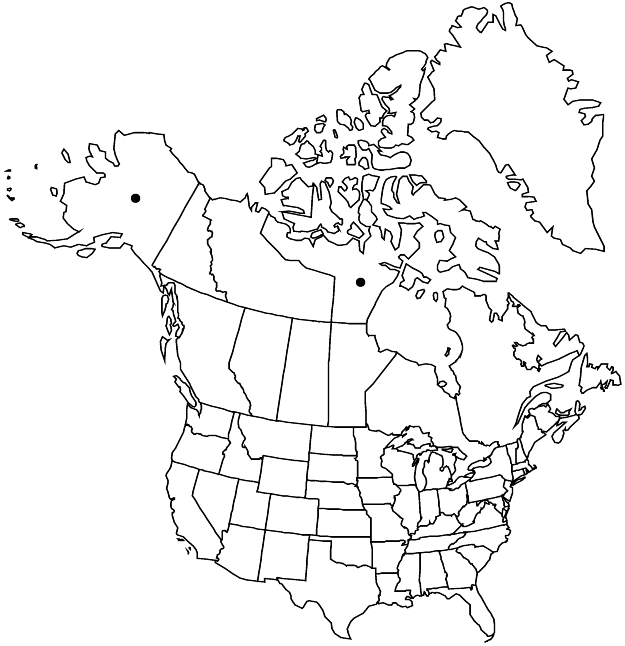Chrysosplenium rosendahlii
Canad. J. Bot. 41: 89, plates 1, 2, figs. 6, 7. 1963 ,.
Stolons white, 0.3–1 mm diam., sparsely villous, hairs white, reddish brown, or purplish. Flowering stems erect, branching in distal 1/10–1/4(–1/2), (1.8–)4–10 cm, glabrous. Leaves alternate, membranous or fleshy. Stolon leaves: petiole 4–21 mm, sparsely villous or, rarely, glabrous, hairs white or reddish brown; blade depressed-ovate, depressed-elliptic, or reniform, 4–8 × 4–10 mm, base cordate, margins 5–7-crenate, not purple-spotted, glabrous or sparsely ciliate, hairs white, surfaces sparsely villous, hairs white, sometimes purplish, especially near petiole. Cauline leaves absent or 1(–2); petiole 1–13 mm, glabrous or villous, hairs purplish; blade depressed-ovate to reniform or flabellate, 3–5 × 3.5–7 mm, base cordate to truncate, margins 3–5(–7)-crenate, glabrous, surfaces glabrous or villous, hairs scattered, purplish. Inflorescences terminal, 3–15-flowered, compact cymes; bracts greenish yellow, sometimes purple-spotted, foliaceous, depressed-ovate to flabellate, 2–5 × 3–9 mm, margins subentire or 3–5-crenate. Pedicels absent or 0.1–1 mm. Flowers: hypanthium green or yellowish, usually purple-spotted, campanulate, 1.8–2.2 × 1.8–3 mm, glabrous; sepals spreading, green or greenish yellow, usually purple-spotted distally, rarely not purple-spotted, broadly ovate to depressed-ovate, 1–1.6 × 1.4–2.2 mm, apex obtuse to rounded; nectary disc apparently absent; stamens 5–8, 0.5–0.8 mm; anthers yellow, 0.2–0.4 × 0.2–0.4 mm; styles 0.3–0.4(–0.5) mm. Seeds 7–26, reddish brown, ovoid to ellipsoid, 0.8–1.1 mm, glabrous. 2n = 96.
Phenology: Flowering Jun–Aug.
Habitat: Wet sedge meadows, moist depressions, marshy ground, bogs
Elevation: 0-100 m
Distribution

Nunavut, Alaska.
Discussion
Chrysosplenium rosendahlii appears to be restricted in Canada to southern islands of the Canadian Arctic Archipelago and coastal areas of the mainland in northern Nunavut. Alaskan records extend from Beaufort Lagoon west to the vicinity of Prudhoe Bay. We have not seen specimens from coastal Yukon, Northwest Territories, or western Nunavut, where suitable habitat exists. Across its range, C. rosendahlii may be overlooked because of its similarity to C. tetrandrum.
J. G. Packer (1963) reported that flowers very rarely bear five sepals. L.-P. Ronse Decraene et al. (1998) reported this atavism also in Chrysosplenium alternifolium Linnaeus. No such flowers were observed among specimens examined for this study.
Selected References
None.